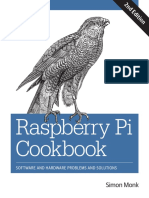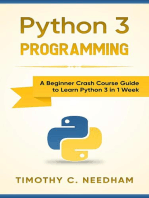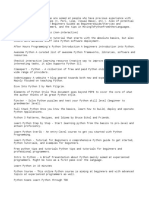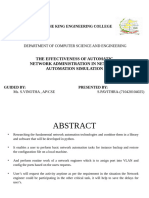0 ratings0% found this document useful (0 votes)
53 viewsPython - Level Two
This document provides an overview of topics that will be covered in a Python Level Two course, including advanced scope rules, object-oriented programming, errors and exceptions, modules and packages, and regular expressions. The course will allow students to learn more advanced Python concepts to facilitate using the Django web framework. It introduces key Python concepts like the LEGB scope rule and using object-oriented programming to build a card game project.
Uploaded by
Oscar CantareroCopyright
© © All Rights Reserved
We take content rights seriously. If you suspect this is your content, claim it here.
Available Formats
Download as PDF, TXT or read online on Scribd
0 ratings0% found this document useful (0 votes)
53 viewsPython - Level Two
This document provides an overview of topics that will be covered in a Python Level Two course, including advanced scope rules, object-oriented programming, errors and exceptions, modules and packages, and regular expressions. The course will allow students to learn more advanced Python concepts to facilitate using the Django web framework. It introduces key Python concepts like the LEGB scope rule and using object-oriented programming to build a card game project.
Uploaded by
Oscar CantareroCopyright
© © All Rights Reserved
We take content rights seriously. If you suspect this is your content, claim it here.
Available Formats
Download as PDF, TXT or read online on Scribd
You are on page 1/ 35
Python Level Two
Let’s learn something!
Django Bootcamp
● Welcome to Python Level Two!
● In this section we will be covering more
advanced topics that will allow you to
use Django with ease!
● Knowing these topics will make your
transition to Django very smooth!
Let’s get started!
Let’s learn something!
Part 1 - Scope
Python - Level Two
Django Bootcamp
● We’ve discussed Scope a bit in the past,
but Python’s Scope rules can sometimes
confuse beginners, so let’s quickly go
over the key rules of Python’s Scope
Django Bootcamp
● Python Scope follows the LEGB Rule:
○ Local
○ Enclosing Function locals
○ Global
○ Built-in
Django Bootcamp
● L: Local — Names assigned in any way
within a function (def or lambda)), and
not declared global in that function.
● E: (EFLs) — Name in the local scope of
any and all enclosing functions (def or
lambda), from inner to outer.
Django Bootcamp
● G: Global (module) — Names assigned at
the top-level of a module file, or declared
global in a def within the file.
● B: Built-in (Python) — Names
preassigned in the built-in names
module : open,range,SyntaxError,...
Django Bootcamp
● Let’s walk through some simple
examples that make Python’s scope
clear!
Part 2 - Object Oriented
Programming
Python - Level Two
Django Bootcamp
● Object Oriented Programming is a way
to use Python to create our own Objects.
● It can be a point of great confusion for
beginners, mainly because often it is
taught poorly!
Django Bootcamp
● Let’s try our best to save you from any
confusion by systematically showing you
the thought process behind OOP and
why we would need it.
● We will use it quite a bit for Django, so
let’s get started!
Part 3 - OOP Project
Python - Level Two
Django Bootcamp
● OOP is fundamental to becoming a good
Python programmer, so let’s get some
extra practice by building a game!
● We will use OOP to create the Card
Game War!
Django Bootcamp
● The relevant file is:
○ Part3_OOP_Project.py
Django Bootcamp
● Feel free to either treat this as a
code-along project, or attempt it on your
own first!
● Let’s get a quick look at the project!
Part 3 - OOP Project
Solutions
Python - Level Two
Part 4 - Errors and
Exceptions
Python - Level Two
Django Bootcamp
● Often times our code isn’t perfect,
meaning we run into Errors!
● But how do we actually set-up our own
Error and Exception calls?
● Let’s find out!
Django Bootcamp
● We can use these keywords:
○ Try
○ Except
○ Finally
● To dictate our code logic in case of an
error!
Django Bootcamp
● To show how this works we will be
opening files, one way to open files is to
use the open() function:
○ open(“myfile.txt”,’r’)
Django Bootcamp
● The second parameter in the open()
function dictates whether you are
opening the file for just reading, just
writing, or to do both.
● If you use the wrong one, you may get an
error!
Django Bootcamp
● Let’s use this to show how we can handle
errors!
Part 5 - Decorators
Python - Level Two
Django Bootcamp
● Decorators are an advanced tool in
Python, feel free to skip this lecture and
come back to it at another time.
● We won’t encounter Decorators until
much further into the Advanced Django
material.
Django Bootcamp
● We leave this lecture in this section
because material wise this makes the
most sense but as far as using it in the
course, it is recommended you skip this
for now and come back to it when you
see decorators mentioned again!
Django Bootcamp
● Alright, let’s get started!
Part 6 -
Modules and Packages
Python - Level Two
Django Bootcamp
● You’ve seen Python import statements,
but have probably wondered, how do
they work and how do we create our
own?
● Let’s find out!
Part 7 -
Name and Main
Python - Level Two
Django Bootcamp
● An often confusing part of Python is a
mysterious line of code:
○ if __name__ == "__main__":
Django Bootcamp
● Sometimes when you are importing
from a module, you would like to know
whether a modules function is being
used as an import, or if you are using the
original .py file of that module.
Django Bootcamp
● Let’s explore this some more, but make
sure to check out the full explanatory
text file that is in this part’s folder!
Part 8 -
Regular Expressions
Python - Level Two
Django Bootcamp
● Regular Expressions allow us to search
for patterns in Python strings.
● They can seem incredibly intimidating at
first due to their strange syntax!
● We’ll walk through the basics of regular
expressions, we will use them in Django!
You might also like
- Python Programming : How to Code Python Fast In Just 24 Hours With 7 Simple StepsFrom EverandPython Programming : How to Code Python Fast In Just 24 Hours With 7 Simple Steps4/5 (55)
- Python Programming For Beginners: Learn The Basics Of Python Programming (Python Crash Course, Programming for Dummies)From EverandPython Programming For Beginners: Learn The Basics Of Python Programming (Python Crash Course, Programming for Dummies)5/5 (1)
- Python Programming: Your Beginner’s Guide To Easily Learn Python in 7 DaysFrom EverandPython Programming: Your Beginner’s Guide To Easily Learn Python in 7 Days2.5/5 (3)
- Python | Learn to Code Step by Step: The ultimate beginner's guide for an easy & instant start into programmingFrom EverandPython | Learn to Code Step by Step: The ultimate beginner's guide for an easy & instant start into programmingNo ratings yet
- Programming Puzzles: Python Edition: The Guide to Sharpen Your Coding Skills with Engaging and Challenging PuzzlesFrom EverandProgramming Puzzles: Python Edition: The Guide to Sharpen Your Coding Skills with Engaging and Challenging PuzzlesNo ratings yet
- Python Handbook For Beginners. A Hands-On Crash Course For Kids, Newbies and Everybody ElseFrom EverandPython Handbook For Beginners. A Hands-On Crash Course For Kids, Newbies and Everybody ElseNo ratings yet
- Python Simplified: Learn Programming Through Practical ExamplesFrom EverandPython Simplified: Learn Programming Through Practical ExamplesNo ratings yet
- Best Way To Learn Python (Step-by-Step Guide) : Get CS and Programming Tips For BeginnersNo ratings yetBest Way To Learn Python (Step-by-Step Guide) : Get CS and Programming Tips For Beginners20 pages
- The Best Python Programming Step-By-Step Beginners Guide Easily Master Software engineering with Machine Learning, Data Structures, Syntax, Django Object-Oriented Programming, and AI applicationFrom EverandThe Best Python Programming Step-By-Step Beginners Guide Easily Master Software engineering with Machine Learning, Data Structures, Syntax, Django Object-Oriented Programming, and AI applicationNo ratings yet
- Python Programming: A Hands-On Guide: Hello World E-books STEM, #1From EverandPython Programming: A Hands-On Guide: Hello World E-books STEM, #1No ratings yet
- Python for Beginners. A Smarter Way to Learn Python in 5 Days and Remember it Longer. With Easy Step by Step Guidance and Hands on Examples. (Python Crash Course-Programming for Beginners)From EverandPython for Beginners. A Smarter Way to Learn Python in 5 Days and Remember it Longer. With Easy Step by Step Guidance and Hands on Examples. (Python Crash Course-Programming for Beginners)No ratings yet
- Python Programming Illustrated For Beginners & Intermediates: “Learn By Doing” Approach-Step By Step Ultimate Guide To Mastering Python: The Future Is Here!: The Future Is Here!From EverandPython Programming Illustrated For Beginners & Intermediates: “Learn By Doing” Approach-Step By Step Ultimate Guide To Mastering Python: The Future Is Here!: The Future Is Here!4/5 (2)
- Python Programming Illustrated For Beginners & Intermediates“Learn By Doing” Approach-Step By Step Ultimate Guide To Mastering Python: The Future Is Here!From EverandPython Programming Illustrated For Beginners & Intermediates“Learn By Doing” Approach-Step By Step Ultimate Guide To Mastering Python: The Future Is Here!3/5 (1)
- A Slackers Guide to Coding with Python: Ultimate Beginners Guide to Learning Python QuickFrom EverandA Slackers Guide to Coding with Python: Ultimate Beginners Guide to Learning Python Quick1/5 (1)
- Python Programming: Your Step By Step Guide To Easily Learn Python in 7 DaysFrom EverandPython Programming: Your Step By Step Guide To Easily Learn Python in 7 Days3/5 (9)
- Unwired Learning: The Ultimate Python Developer BundleNo ratings yetUnwired Learning: The Ultimate Python Developer Bundle19 pages
- PYTHON: Practical Python Programming For Beginners & Experts With Hands-on ProjectFrom EverandPYTHON: Practical Python Programming For Beginners & Experts With Hands-on Project5/5 (4)
- Python Programming for Beginners: A guide to Python computer language, computer programming, and learning Python fast!From EverandPython Programming for Beginners: A guide to Python computer language, computer programming, and learning Python fast!5/5 (1)
- Python 3 Programming: A Beginner Crash Course Guide to Learn Python 3 in 1 WeekFrom EverandPython 3 Programming: A Beginner Crash Course Guide to Learn Python 3 in 1 Week3.5/5 (3)
- Python Programming: 8 Simple Steps to Learn Python Programming Language in 24 hours! Practical Python Programming for Beginners, Python Commands and Python LanguageFrom EverandPython Programming: 8 Simple Steps to Learn Python Programming Language in 24 hours! Practical Python Programming for Beginners, Python Commands and Python Language2/5 (1)
- Python Programming For Beginners: Python Programming Language TutorialFrom EverandPython Programming For Beginners: Python Programming Language TutorialNo ratings yet
- SP4 Mom ZR 5 WBZPZdud D3 Ea Ma RTEc MDDGD 1 A WAn Ix VNo ratings yetSP4 Mom ZR 5 WBZPZdud D3 Ea Ma RTEc MDDGD 1 A WAn Ix V11 pages
- Python Robotics for Kids: A Guide to Spike Prime Robot with Object-Oriented Programming: Robotics, #1From EverandPython Robotics for Kids: A Guide to Spike Prime Robot with Object-Oriented Programming: Robotics, #1No ratings yet
- Python for Serious Beginners: A Practical Introduction to Modern Python with Simple Hands-on Projects: Real Programming Lessons for Smart Learners, #2From EverandPython for Serious Beginners: A Practical Introduction to Modern Python with Simple Hands-on Projects: Real Programming Lessons for Smart Learners, #2No ratings yet
- Python: Programming For Beginners: Learn The Fundamentals of Python in 7 DaysFrom EverandPython: Programming For Beginners: Learn The Fundamentals of Python in 7 Days3/5 (10)
- Python: Programming For Intermediates: Learn The Basics Of Python In 7 Days!From EverandPython: Programming For Intermediates: Learn The Basics Of Python In 7 Days!No ratings yet
- Whetting Your Appetite: If For Range Break Continue Else PassNo ratings yetWhetting Your Appetite: If For Range Break Continue Else Pass5 pages
- Caltech Data Analytics Bootcamp BrochureNo ratings yetCaltech Data Analytics Bootcamp Brochure26 pages
- A Comparative Study of Programming Languages in Rosetta Code PDFNo ratings yetA Comparative Study of Programming Languages in Rosetta Code PDF293 pages
- Pandas: Powerful Python Data Analysis Toolkit: Release 0.7.1No ratings yetPandas: Powerful Python Data Analysis Toolkit: Release 0.7.1283 pages
- Python Design Pattern (Python Technologies)100% (1)Python Design Pattern (Python Technologies)121 pages
- Python Python For Data Science and Machine Learning100% (4)Python Python For Data Science and Machine Learning165 pages
- B.Tech. Second Year III Semester SyllabusNo ratings yetB.Tech. Second Year III Semester Syllabus17 pages
- Configuration Desk Automating Tool HandlingNo ratings yetConfiguration Desk Automating Tool Handling324 pages

























































































